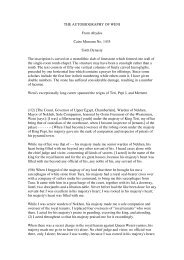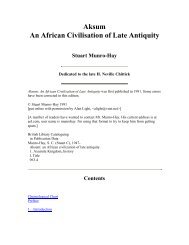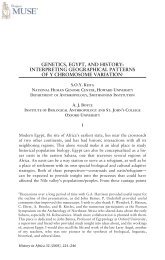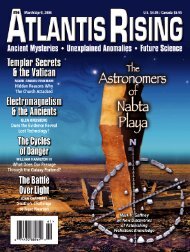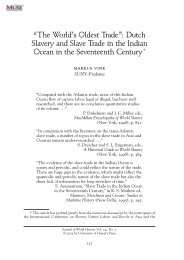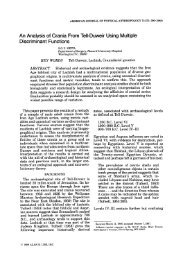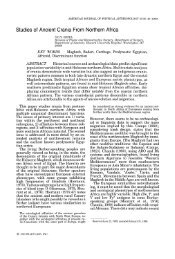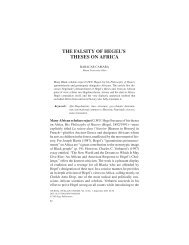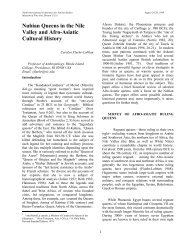The Negro trail blazers of California [microform] : a ... - Homestead
The Negro trail blazers of California [microform] : a ... - Homestead
The Negro trail blazers of California [microform] : a ... - Homestead
You also want an ePaper? Increase the reach of your titles
YUMPU automatically turns print PDFs into web optimized ePapers that Google loves.
OF CALIFORNIA 29<br />
Galvaz had said to Junipero Serra "<br />
: If Saint Francis wants a Mission let him cause his<br />
port to be discovered."<br />
Portolo was told <strong>of</strong> the unsuccessful efforts to convert the heathen and that the ship<br />
with the supplies was months overdue. He, too, wanted to return to Mexico City before<br />
they were out <strong>of</strong> supplies, and could see no reason for longer remaining in <strong>California</strong>.<br />
He tells Serra that he is an old man and that they will take him back by force, whereupon<br />
Junipero Serra ran up on to the hill back <strong>of</strong> the Mission and said: "Though you all<br />
return, I will remain alone with God to save <strong>California</strong>."<br />
Let the reader for a moment think <strong>of</strong> Christ in the Garden <strong>of</strong> Gethsemane and this<br />
saint <strong>of</strong> the order <strong>of</strong> Saint Francis climbing the hills <strong>of</strong> San Diego that he might be alone<br />
to talk and plead with God and finish his Novena. He prayed all day, wrestling as it<br />
were with God to send him help that the expedition would not abandon <strong>California</strong>, and<br />
that the Missionary Fathers would yet win many souls to the glory <strong>of</strong> God, our Lord. He<br />
had been sending his petitions to the court <strong>of</strong> heaven for nine days. <strong>The</strong> entire party<br />
were packing and making ready to sail back to Mexico with the setting <strong>of</strong> the sun. Even<br />
so, Serra continued to pray, unheeding their working. <strong>The</strong> sun was fast setting, no relief<br />
ship in sight, no baptism, no conversion. <strong>The</strong> party said that they would sail at the setting<br />
<strong>of</strong> the sun. Portolo ordered the sails unfurled and they began to embark (so historians<br />
tell us), but behold, there is nothing impossible with God, and just as the sun was<br />
almost setting over the beautiful Bay <strong>of</strong> San Diego, just around what is now known as<br />
Point Loma appeared a white sail. In a few moments the full view <strong>of</strong> the San Antonio<br />
loomed in sight. On the shore there were Monks and the rest <strong>of</strong> the party unfurling the<br />
sails <strong>of</strong> the San Carlos and embarking ready to sail at the setting <strong>of</strong> the sun, abandoning<br />
<strong>California</strong>, while only one member <strong>of</strong> the party was willing to trust God to answer his<br />
prayers in his own way and time.<br />
<strong>The</strong> land party was convinced that they had sighted the San Antonio and ran to tell<br />
Junipero Serra that <strong>California</strong> was saved. <strong>The</strong> day before the ship reached port, the first<br />
Christian baptism according to the Holy Catholic Church was performed. Serra did not care<br />
if they did return to either Spain or Mexico. He did not care if they reported their efforts<br />
to the King <strong>of</strong> Spain or the Euler <strong>of</strong> Mexico, he had come to <strong>California</strong> to wage war<br />
against sin under the leadership <strong>of</strong> a captain who had never lost a battle, the Captain and<br />
King <strong>of</strong> Glory, Christ our Lord, who heard his prayers. <strong>The</strong> ship San Antonio was so much<br />
overdue, they supposed the party had all gone to Monterey and did not stop at San Diego.<br />
But, just before she reached Santa Barbara, we are told, she broke a rudder and went<br />
into port to repair it, and while there the natives told them <strong>of</strong> the land expedition going<br />
south, resulting in the San Antonio reversing her course and returning to San Diego. Junipero<br />
Serra 's prayers were answered. Portolo and the expedition did not abandon <strong>California</strong>.<br />
Mr. John Steven McGroarty, in the "Mission Play," and also in his "History <strong>of</strong><br />
<strong>California</strong>," pays a beautiful tribute to the Bay <strong>of</strong> San Diego, calling it the "Harbor<br />
<strong>of</strong> the sun and the bright shores <strong>of</strong> glory." <strong>The</strong> writer read his description before fully<br />
studying the history <strong>of</strong> <strong>California</strong>, but she is convinced, since reading the life <strong>of</strong> Junipero<br />
Serra by his lifelong friend Palou, and taking into consideration the beauty <strong>of</strong> the Bay<br />
<strong>of</strong> San Diego, the answer to the earnest prayers <strong>of</strong> Serra, resulting in the Missionary<br />
Fathers remaining and not abandoning <strong>California</strong>, that many tributes have been paid to<br />
this State which at first may seem overdrawn, but afterwards prove fitting.<br />
<strong>The</strong> San Antonio was sighted <strong>of</strong>f Point Loma in San Diego Bay, returning from<br />
Santa Barbara, while, in sight <strong>of</strong> the shore, that saint <strong>of</strong> God, Junipero Serra, was on the<br />
hill talking alone to his Maker. Through the anxious prayers and labor <strong>of</strong> the President<br />
Father Junipero Serra, Crespi, Palou and the other Franciscan Friars composing the company<br />
<strong>of</strong> missionaries, we find in a few years the shores <strong>of</strong> <strong>California</strong> which, during the<br />
previous hundreds <strong>of</strong> years had lain a barren waste, dotted with successfully managed Missions.<br />
George Wharton James says <strong>of</strong> their work in "<strong>The</strong> old Franciscan Missions" (p.<br />
65) : "Personally, I regard the education given by the Padres as exemplary, even though I<br />
materially differ from them as to some <strong>of</strong> the things they regarded as religious essentials,<br />
yet, in honor it must be said that if I, or the church to which I belong, or you, and the<br />
church to which you belong, reader, had been in <strong>California</strong> in those days, your religious<br />
teachings or mine would have been entitled justly to as much criticism and censure as<br />
have been visited upon the Padres. <strong>The</strong>y did the best they knew how and, as I shall show,<br />
they did most wonderfully well, far better than the enlightened government to which we<br />
belong has ever done."<br />
It was the aim <strong>of</strong> the Holy Fathers to establish Missions about a day's journey apart<br />
on <strong>California</strong>'s coast, and they established twenty-four Missions to the glory <strong>of</strong> God, our<br />
Lord, and the Catholic Church. <strong>The</strong> Padres also taught the Indians how to farm, and do<br />
all kinds <strong>of</strong> labor intelligently. In a measure they mastered the manual arts. <strong>The</strong>y were


![The Negro trail blazers of California [microform] : a ... - Homestead](https://img.yumpu.com/32436613/33/500x640/the-negro-trail-blazers-of-california-microform-a-homestead.jpg)

